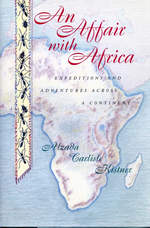
In June 1960, a young faculty wife named Alzada Kistner and her husband David, a promising entomologist, left their 18-month old daughter in the care of relatives and began what was to be a four month scientific expedition in the Belgian Congo. Three weeks after their arrival, the country was gripped by a violent revolution trapping the Kistners in its midst. Despite having to find their way out of numerous life-threatening situations, the Kistners were not to be dissuaded. An emergency airlift by the United States Air Force brought them to safety in Kenya where they continued their field work.
Thus began three decades of adventures in science. In An Affair with Africa, Alzada Kistner describes her family's African experience -- the five expeditions they took beginning with the trip to the Belgian Congo in 1960 and ending in 1972-73 with a nine-month excursion across southern Africa. From hunching over columns of ants for hours on end while seven months pregnant to eating dinner next to Idi Amin, Kistner provides a lively and humor-filled account of the human side of scientific discovery. Her wonderfully detailed stories clearly show why, despite hardship and danger -- and contrary to all of society's expectations -- she could not forsake accompanying her husband on his expeditions, and, to this day, continues to find the world "endlessly beckoning, a lively bubbling cauldron of questions and intrigue."
In the spirit of Beryl Markham's West with the Night and Isak Dinesen's Out of Africa, An Affair with Africa shares with readers the thoughts and experiences of a remarkable woman, one whose unquenchable thirst for adventure led her into a series of almost unimaginable situations. Readers -- from armchair travelers fascinated by stories of Africa to scientists familiar with the Kistners's work but unaware of the lengths to which they went to gather their data -- will find An Affair with Africa a rare treasure.


A discipline is emerging called cultural psychology; it will serve as a force of renewal for both anthropology and psychology. In this book Richard Shweder presents its manifesto. Its central theme is that we have to understand the way persons, cultures, and natures make each other up. Its goal is to seek the mind indissociably embedded in the meanings and resonances that are both its product and its components.
Over the past thirty years the person as a category has disappeared from ethnography. Shweder aims to reverse this trend, focusing on the search for meaning and the creation of intentional worlds. He examines the prospect for a reconciliation of rationality and relativism and defines an intellectual agenda for cultural psychology.
What Shweder calls for is an exploration of the human mind, and of one’s own mind, by thinking through the ideas and practices of other peoples and their cultures. He examines evidence of cross-cultural similarities and differences in mind, self, emotion, and morality with special reference to the cultural psychology of a traditional Hindu temple town in India, where he has done considerable work in comparative anthropology. And he critiques the concept of the “person” implicit in Western social science, as well as psychiatric theories of the “subject.” He maintains that it will come as no surprise to cultural psychology if it should turn out that there are different psychological generalizations or “nomological networks”—a Hindu psychology, a Protestant psychology—appropriate for the different semiotic regions of the world. Shweder brings the news that God is alive not dead, but that there are many gods.
READERS
Browse our collection.
PUBLISHERS
See BiblioVault's publisher services.
STUDENT SERVICES
Files for college accessibility offices.
UChicago Accessibility Resources
home | accessibility | search | about | contact us
BiblioVault ® 2001 - 2024
The University of Chicago Press









